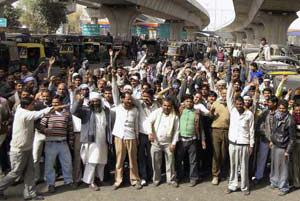- Home
- News
- Features
- Topics
- Labor
- Management
- Opinions/Blogs
- Tools & Resources
United Trade Unions General Strike Brings India To A Halt
By ROBERT SCALLY– By far the largest labor action in the world during the week of 27 February 2012 took place in India, where a one-day nationwide general strike brought commerce in the world’s second most populous nation to a standstill.
The strike took place Tuesday, 28 February 2012, and was called by 11 central trade unions, including government workers. Millions of Indian workers joined the call for stronger labor laws and a minimum wage and stayed home. Transportation, banking and the postal system were virtually shut down in many major cities, according to published reports.
The trade union movement in India is generally divided on political lines and India’s trade unions had a combined membership of 24,601,589 in 2002.
The strike was another challenge to Indian Prime Minister Manmohan Singh, who asked the trade unions to call off the action. Singh’s government has been hit by a series of high-profile corruption scandals, including real estate and telecommunications scams. Singh is also struggling to keep India’s inflation rate in single digits while the nation’s economy is growing at its slowest pace in three years.
Sanjeeva Reddy, president of the Indian National Trade Union Congress, said Tuesday’s strike was historically significant because it unified a number of politically opposed groups.
“This time, they all joined together. After independence, this is the first time all trade unions have come together and gone on strike,” Reddy told Voice of America.
Among the demands by India’s unionized government workers are curtailing the government hiring of contract workers the also want the government to stop privatizing state-run companies.
Unionized workers in other business sectors are demanding a national minimum wage, permanent jobs for 50 million contract workers and more government efforts to rein in inflation.
Indian business lobby group ASSOCHAM denounced the strike saying losses could reach 100 billion rupees (US$2 billion), according to an AFP report.
“Trade unions must lean that economic issues are best kept away from the political agenda. Official figures show that inflation rate hovering near double digits for most of the last two years has come down to 7.5%,” ASSOCHAM secretary-general D.S. Rawat said in a statement. “Industrial strikes cause huge losses to the national exchequer and should not be there as the country strives to achieve 9% GDP growth in the coming years.”
List your business in the premium web directory for free This website is listed under Human Resources Directory






